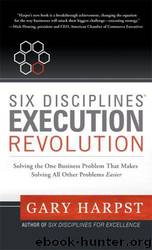Six Disciplines Execution Revolution: Solving the One Business Problem That Makes Solving All Other Problems Easier by Gary Harpst

Author:Gary Harpst
Language: eng
Format: mobi
Publisher: Greenleaf Book Group Press
Published: 2008-06-30T14:00:00+00:00
Figure 7.0-The Six Disciplines Methodology: six disciplines, thirty-one steps, in a single, repeatable methodology
The assumption in having a methodology is that it is used repeatedly. Repeatability is a topic worth looking at in more detail.
Repeatability is critical to learning. For example, how good were you the first time you rode a bike, pitched a ball, or gave a speech? Individuals learn by doing, and organizations must do the same thing. As in all types of endeavors, it takes practice and repetition to become excellent. The absolute foundation of building an organization that is increasing its ability to execute is a repeatable methodology.
You can think of the six disciplines in our methodology as a series of cycles: annually, quarterly, weekly and daily. With each successive pass, they help grow your organization's ability to deal with an ever-changing and increasingly challenging business environment.
These six fundamental disciplines distill and integrate into one cohesive whole many of the separate best practices discussed earlier, from the areas of strategic planning, continuous improvement, organizational learning, business process automation, performance management, and quality management.
Along the way, we stripped out concepts and processes that don't apply to small or midsized businesses, and we've peppered this synergistic mix with time-tested principles and empowering tools to offer the best of the best. Thousands of hours of market and field research, and more than 100 man-years of trial and error are the foundation of this business-building methodology, giving it a unified, experience-based quality.
The result is a repeatable organizational learning model. We believe that the necessity for repeatability is what business people inherently understand when they define excellence as an enduring pursuit—an on-going journey that never ends. We're building on that truth and challenging business leaders to realize that an enduring pursuit requires an enduring approach. Since today's success will stimulate future growth and change, tomorrow's challenges will not only be different, they'll be bigger. This means organizations must learn how to learn so that they are always preparing for tomorrow. Otherwise, growth and success will lead to challenges that overwhelm their ability to execute strategy.
Let's move on to another topic related to learning: team member engagement. You've probably heard the old joke in which someone asks a CEO how many people work in his company and he responds, "About half of them." This isn't funny when you look at the following statistics, and begin to realize how much time, energy, and resources are wasted every day. An important goal for any business-building methodology is to address how to engage the team.
According to research from The Gallup Organization, regarding the U.S. working population, 26 percent are engaged, 55 percent are not engaged, and 19 percent are actively disengaged. The most engaged workplaces (those in the top 25 percent of Q12 scores,) were:
Download
This site does not store any files on its server. We only index and link to content provided by other sites. Please contact the content providers to delete copyright contents if any and email us, we'll remove relevant links or contents immediately.
Hit Refresh by Satya Nadella(9125)
The Compound Effect by Darren Hardy(8942)
Change Your Questions, Change Your Life by Marilee Adams(7758)
Nudge - Improving Decisions about Health, Wealth, and Happiness by Thaler Sunstein(7690)
The Black Swan by Nassim Nicholas Taleb(7106)
Deep Work by Cal Newport(7063)
Rich Dad Poor Dad by Robert T. Kiyosaki(6605)
Daring Greatly by Brene Brown(6501)
Principles: Life and Work by Ray Dalio(6417)
Playing to Win_ How Strategy Really Works by A.G. Lafley & Roger L. Martin(6230)
Man-made Catastrophes and Risk Information Concealment by Dmitry Chernov & Didier Sornette(6003)
Big Magic: Creative Living Beyond Fear by Elizabeth Gilbert(5754)
Digital Minimalism by Cal Newport;(5748)
The Myth of the Strong Leader by Archie Brown(5496)
The Slight Edge by Jeff Olson(5410)
Discipline Equals Freedom by Jocko Willink(5378)
The Motivation Myth by Jeff Haden(5204)
The Laws of Human Nature by Robert Greene(5171)
Stone's Rules by Roger Stone(5081)
